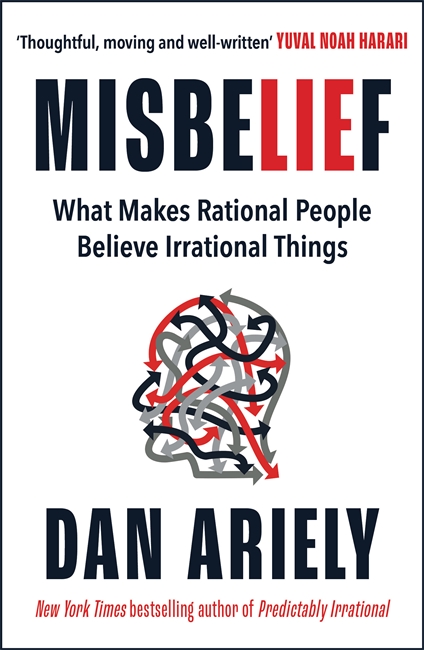
Misbelief
Imprint: Heligo Books
Synopsis
'Thoughtful, moving and well-written' - Yuval Noah Harari
'An urgent examination of the human attraction to misinformation' - Daniel H. Pink
Misinformation affects us daily, from social media to politics and even personal relationships. Policing social media alone cannot solve the complex problem shaped by partisan politics and subjective interpretations of truth.
In Misbelief social scientist Dan Ariely explores the behaviour of 'misbelief' that leads people to distrust accepted truths and embrace conspiracy theories. Misinformation taps into something innate in all of us, regardless of political affiliation. By understanding this psychology, we can mitigate its effects. Grounded in research and Ariely's personal experience as a target of disinformation, the book analyses the psychological drivers behind adopting irrational beliefs. Ariely reveals the emotional, cognitive, personality, and social elements that drive people towards false information and mistrust.
Despite advanced AI generating convincing fake news, Ariely offers hope. Awareness of the forces fuelling misbelief makes individuals and society more resilient. Combating misbelief requires empathy, not conflict. Recognising misbelief as a human problem allows us to be part of the solution.
'An urgent examination of the human attraction to misinformation' - Daniel H. Pink
Misinformation affects us daily, from social media to politics and even personal relationships. Policing social media alone cannot solve the complex problem shaped by partisan politics and subjective interpretations of truth.
In Misbelief social scientist Dan Ariely explores the behaviour of 'misbelief' that leads people to distrust accepted truths and embrace conspiracy theories. Misinformation taps into something innate in all of us, regardless of political affiliation. By understanding this psychology, we can mitigate its effects. Grounded in research and Ariely's personal experience as a target of disinformation, the book analyses the psychological drivers behind adopting irrational beliefs. Ariely reveals the emotional, cognitive, personality, and social elements that drive people towards false information and mistrust.
Despite advanced AI generating convincing fake news, Ariely offers hope. Awareness of the forces fuelling misbelief makes individuals and society more resilient. Combating misbelief requires empathy, not conflict. Recognising misbelief as a human problem allows us to be part of the solution.
Details
352 pages
Imprint: Heligo Books
Reviews
'In this thoughtful, moving and well-written book, Dan Ariely narrates his personal and professional journey to understand the world of misbelievers and conspiracy theories, and offers insights and tips that will hopefully help all of us protect our fragile social fabric from being torn apart by disinformation and distrust.'Yuval Noah Harari, Bestselling author of Sapiens
'Misbelief is an urgent examination of the human attraction to misinformation. This timely book can provide a crucial foundation for building a more empathetic and informed society.'Daniel H. Pink, NYT-bestselling author of The Power of Regret
'Once again Dan Ariely writes in a way that gets us to think and reflect about our human nature. In Misbelief, Ariely helps us understand the nature of our opinions, how they're formed, and how the forces of misinformation can distort them. This is an important book for those who want to understand themselves and the increasingly complex world around us.'Arianna Huffington, Founder & CEO, Thrive Global
'For most of us it is tempting to think that people misbelieve things because they are uneducated, unintelligent, or misinformed. But as one of the world's leading scientists studying beliefs, Dan Ariely, convincingly demonstrates in this important book (and as he discovered first hand in being wrongly accused of leading a nefarious conspiracy!), Misbelief is a process to which any of us can fall prey. More importantly, he offers science-based suggestions on what we can do about the polarization and breakdown in trust that comes with Misbelief.'Michael Shermer, Publisher of Skeptic magazine and author of Conspiracy
